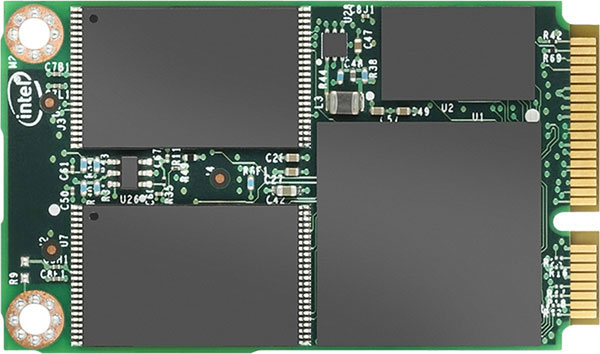Intel 310 Series 80GB mSATA SSD Review
That's all well and good, but as tablets, portable media players, and even ultra-thin notebooks keep shrinking in size, so too will the components they're built around. This is where Intel's new 310 Series SSDs come into play. The 310 Series utilize the same 34nm NAND flash memory technology and controller found on the chip maker's 2.5-inch SSDs, but in a form factor just 1/8th the size. We're talking a scant 2 inches (51mm) long by 1.18 (30mm) wide and flatter than a pancake. And the best part, says Intel, is that despite its diminutive stature, you can expect performance similar to that of the company's popular X25-M 34nm SSD.

|
| Maximum sequential read speed up to 200MB/s Maximum sequential write speed up to 70MB/s 34nm NAND flash memory Multi-Level Cell (MLC) TRIM support (OS dependent) Up to 35,000 IOPS (random 4KB reads) Up to 6,600 IOPS (random 4KB write) 51 x 31 (mm) |
Full-sized mSATA form factor Native Command Queuing (NCQ) MTBF: 1.2 million hours Active power use: 150mW Idle power use: 75mW Warranty: 3 years Shock Resistance: 1,500G (@ 0.5msec half sine wave) O/S Support: Windows XP / Vista / 7 / Mac OS / Linux |

Intel's 310 Series SSDs ship in the following capacities and street prices:
- Intel 310 Series 40GB: $100
- Intel 310 Series 80GB: $190
We have on hand the faster and more capacious of the two, and we also have benchmarks of Intel's X25-M Gen2 80GB on hand to compare it with. Intel claims we'll see similar performance, though we should note the X25-M drive boasts a faster read rating at up to 250MB/s (and the same write speed rating).







